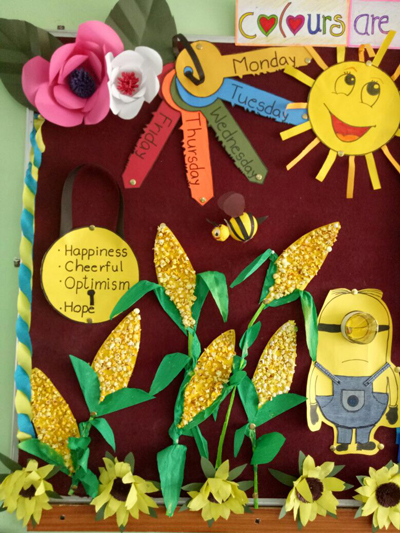
The school follows a combination of progressive Montessori and traditional curriculum, which is age appropriate and uses English as the medium of instruction. Early Childhood Care and Education (ECCE) are today acknowledged as a crucial input and as a foundation for lifelong development. In our country it is also essential to realise the goal of Universal Elementary Education. Research has shown that the first six years of life are critical and it is necessary to optimise development at this stage. A common basic curriculum for the young child must be developmentally appropriate and activity-based, with equitable quality for diverse environments.
Goals and objectives of Early Childhood Education
The goal and objective of Early Childhood Development (ECD) is the all-round, total integration and balanced development of the child, from birth up to school age.
We aim to:
– Enhance the child’s health and physical well-being.
– Involve parents and community.
– Avoid unnecessary burden on the child, and
– Give special attention to children with special needs.
The Theme Approach to activities
The theme approach is based on the concept of integration, which means combining parts to make a whole. This approach to learning, also called “thematic” or “unit approach” focuses on a total learning experience, which engages the child. It thus incorporates and co-ordinates all areas of learning – reading and number readiness, writing readiness, social studies, science, creative activities, drama, music and movement, language activities, etc., in the form of activities related to the theme in focus.
Planning and selecting themes for the whole year is according to the appropriate time and season which helps in pacing out the learning in segments throughout the year. A “WEB OF ACTIVITIES” can be followed to lay down the objectives, content, methodology and evaluation.
Themes are selected to widen the understanding of the child and are selected from the child’s immediate environment and based on the interests.
– The child’s relationship with the physical environment.
– The child’s relationship to self and people.
– The child’s relationship with technology.
– The child’s relationship to the current issues and events.
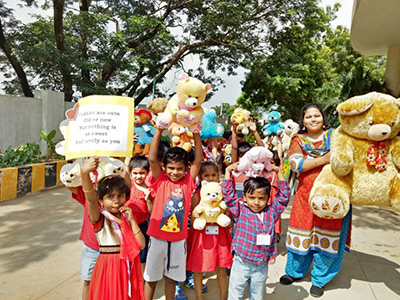
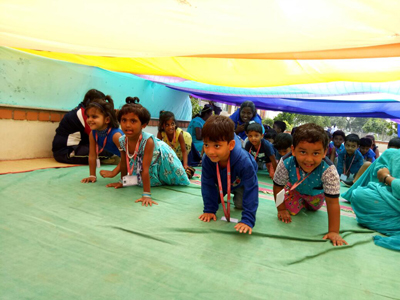
Montessori
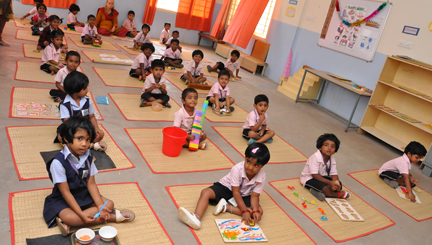
“I did not invent a method of Education, I simply gave little children a choice to live” says Maria Montessori.
According to Dr. Maria, Montessori is an environment whether at home or at school should reveal the nature of the child; not mould him/her. Montessori is a method of education that is based on self-directed activity, hands on learning and collaborative play that incorporates holistic learning outcomes tailored to each individual child’s developmental need and interest.
The teacher, child and environment create a learning triangle. The classroom is prepared by the teacher to encourage independence, freedom within limits, and a sense of order. The child through individual choice, makes use of what the environment offers to develop himself/herself interacting with the teacher when support and /or guidance is needed. Montessori suggests activities that develop child’s language, sensorial, arithmetic, scientific and practical life skills. Montessori also helps the child to develop independence, concentration, will-power, motor- control, self-confidence, sense of judgement etc.
Practical Life: The exercise of practical life are classified under the headings of preliminary exercises, care of the environment, care of the person, grace and courtesy and movement.
Sensorial: The sensorial materials are mathematically graded, they isolate one quality only, keeping the remaining characteristics identical and are limited in both scope and quantity. The sensorial materials allow for individual work and for repetition. The children acquire the habit of working independently, unafraid of making mistakes, becoming comfortable with the fact that errors are essential to the process of learning.
Language: The sand paper letters help to know the shape of the letters. The movable alphabet allows arranging letters to form words. All words are composed of sounds which can be made visible with written signs.
Mathematics: The exercise of practical life gives an opportunity to develop logical and sequential thought patterns. The logical order inherent in the sensorial materials. These materials allow children to work with the quantities 1 to 10 in several dimensions and with the materials they are given their numerical value.
Daily Schedule at school
Kindergarten learning involves many skills and knowledge areas. The skills and concepts involved in childhood learning can be organized into skill groups. The components are: Theme Time, Math Skill, Language Skill, Rhymes and Stories, Art and Craft, Creative Work, Montessori, Edusports, Play Time and Assessment.
Montessori environment: Learning is a continuous process which takes place not only in the school environment but also in the child’s first two environments, the home and the neighborhood. Activities are Language, Sensorial, Arithmetic, Scientific and Practical Life Skills. Our kindergarten schedule is flexible and caters to the needs of the individual child and the group.
In general the kindergartners will participate in the following activities:
Assembly
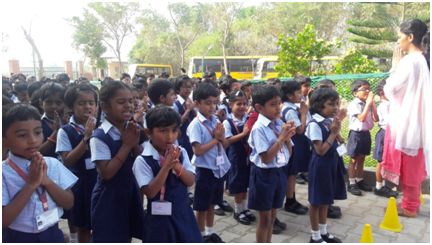
Each morning the class gathers for a morning assembly which consists of a prayer and recitation of slokas.
Circle Time
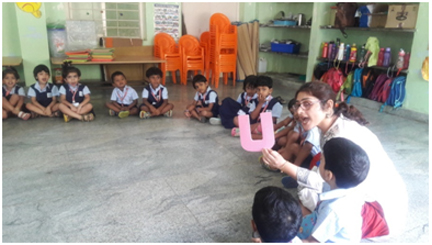
In the morning, each class gathers to participate in a variety of activities which are designed to develop skills in areas such as listening, speaking, social behaviour, celebration, music and math.
Story Time
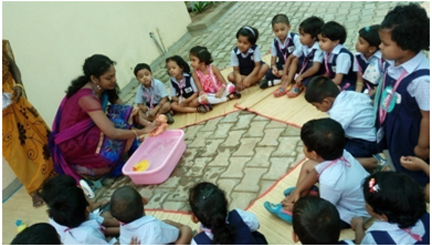
The stories are read aloud in order to strengthen listening and comprehension skills and to foster love towards books. Facilitators make the session very interesting using props, voice modulation and more such expressions.
Rhymes
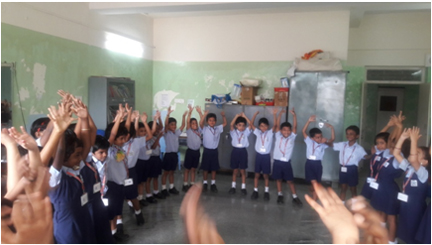
A variety of digital resources are available. Children sing rhymes of different topics, on culture, manners, fruits, vegetables etc., which improves their vocabulary, voice modulation and sense of rhythm.
Reading Time
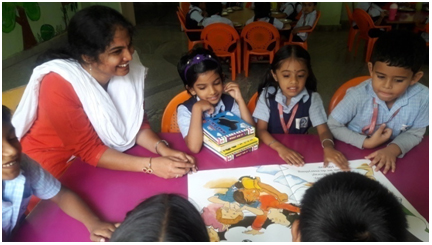
Collection of story books / picture books are distributed to children to encourage and inculcate a habit of reading.
We aim at a well rounded academic, physical and social development programme to enhance the skills of each child.
Playtime
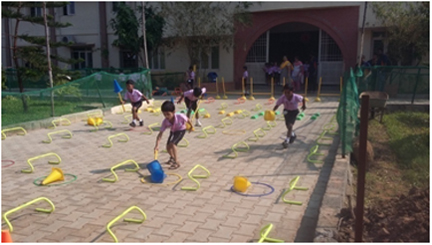
Different indoor and outdoor games will be organised for their overall development.
Mid-morning snacks and Lunch
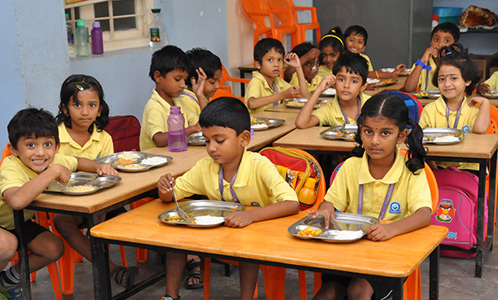
Children will be served healthy and nutritious mid-morning snacks and lunch, to make them energetic and participate actively in the class.
